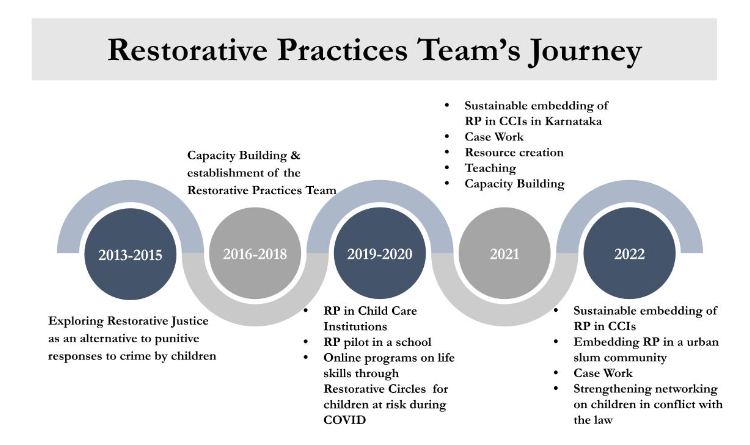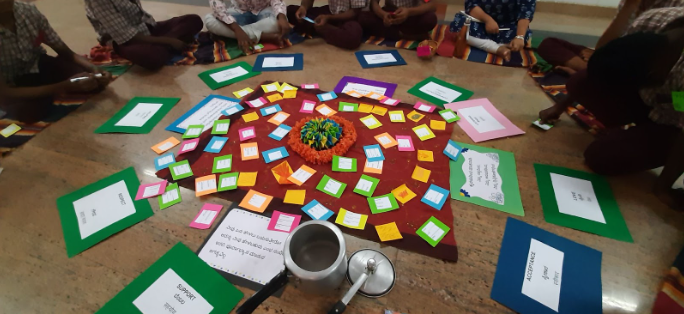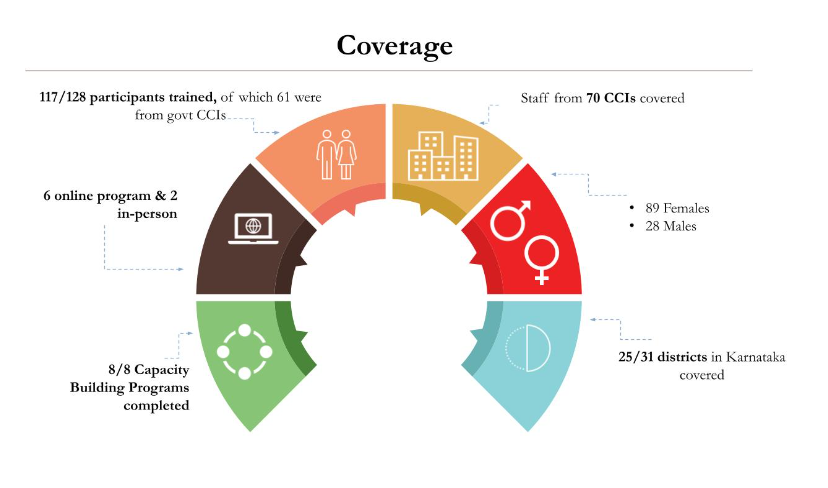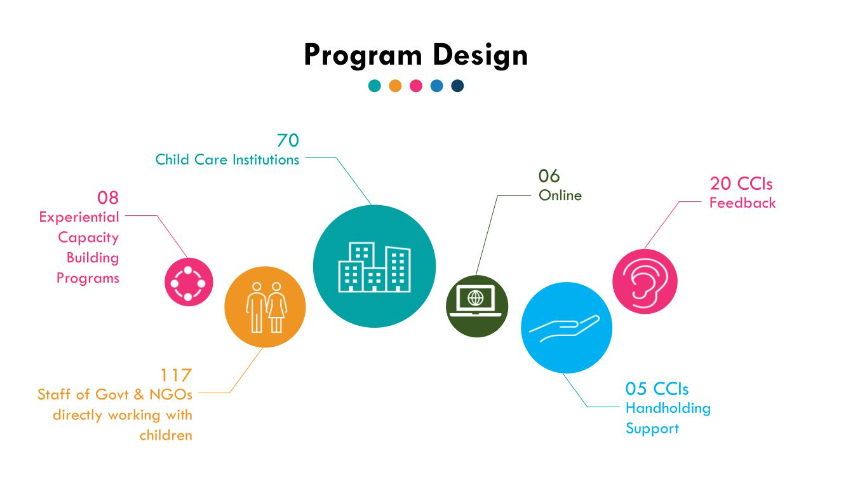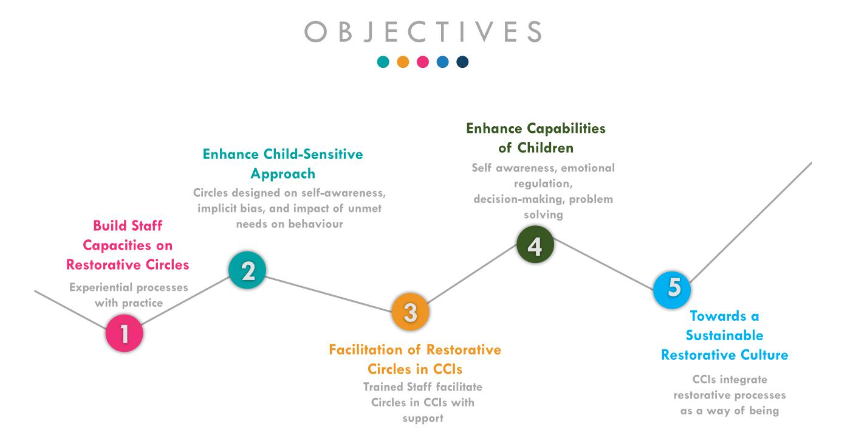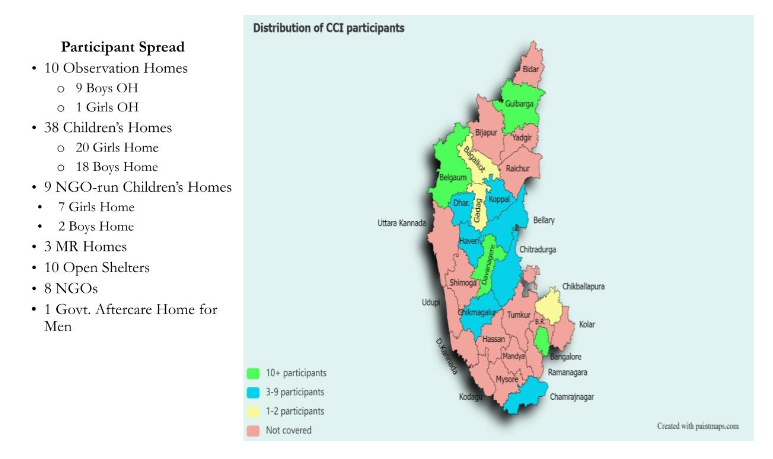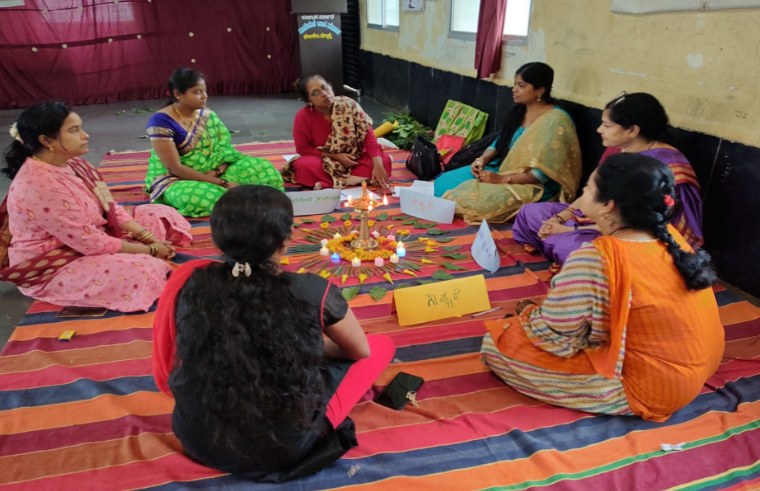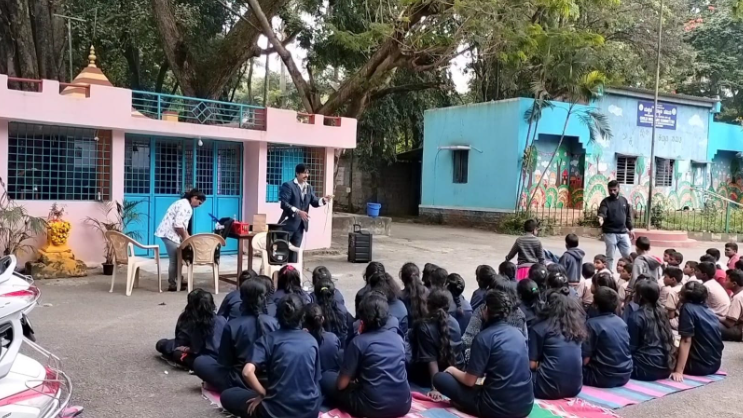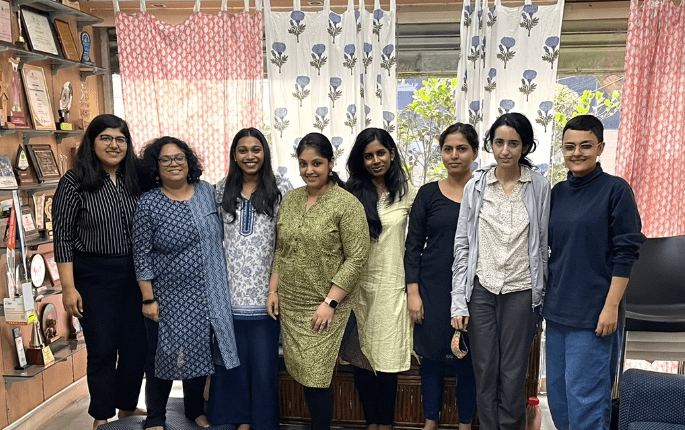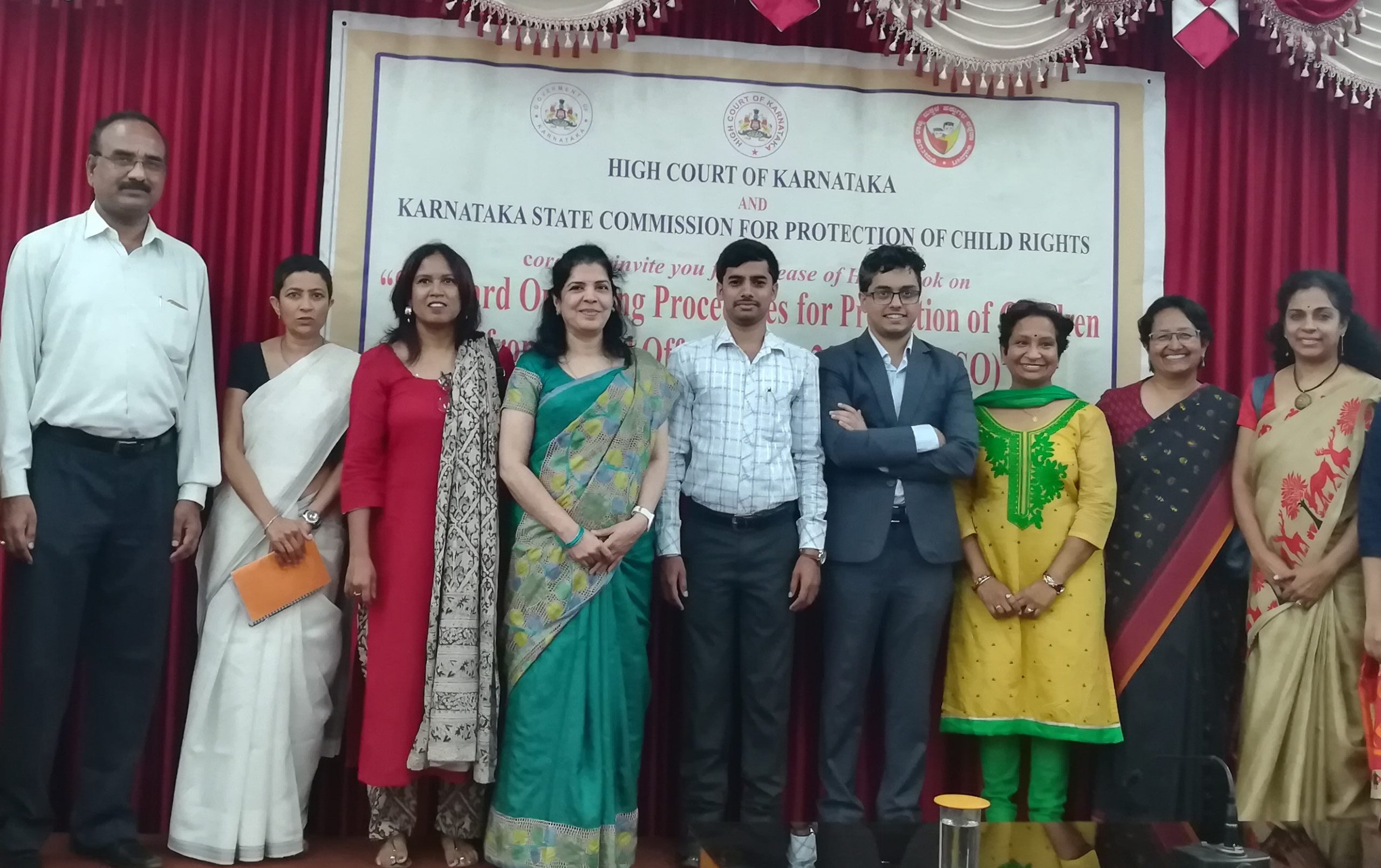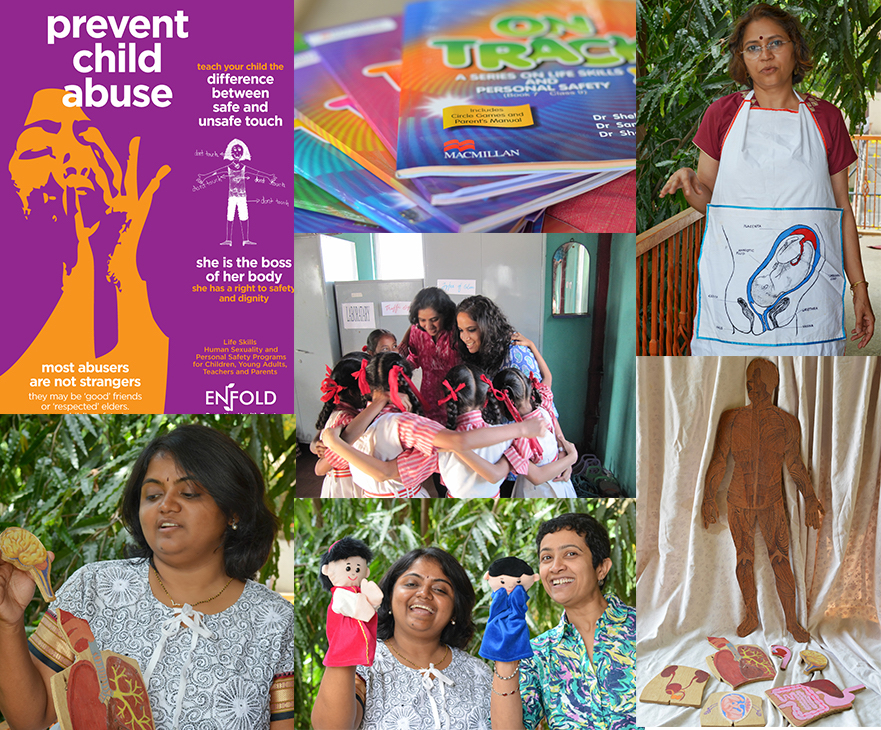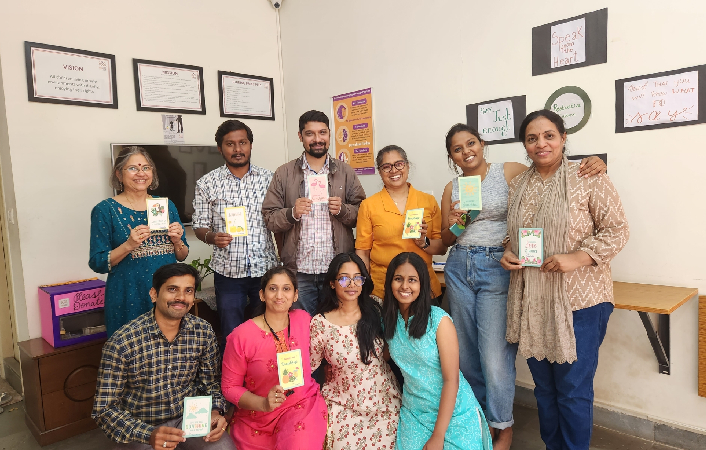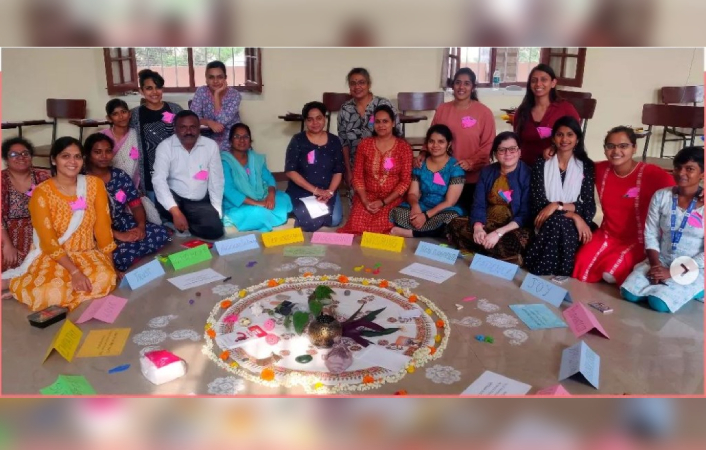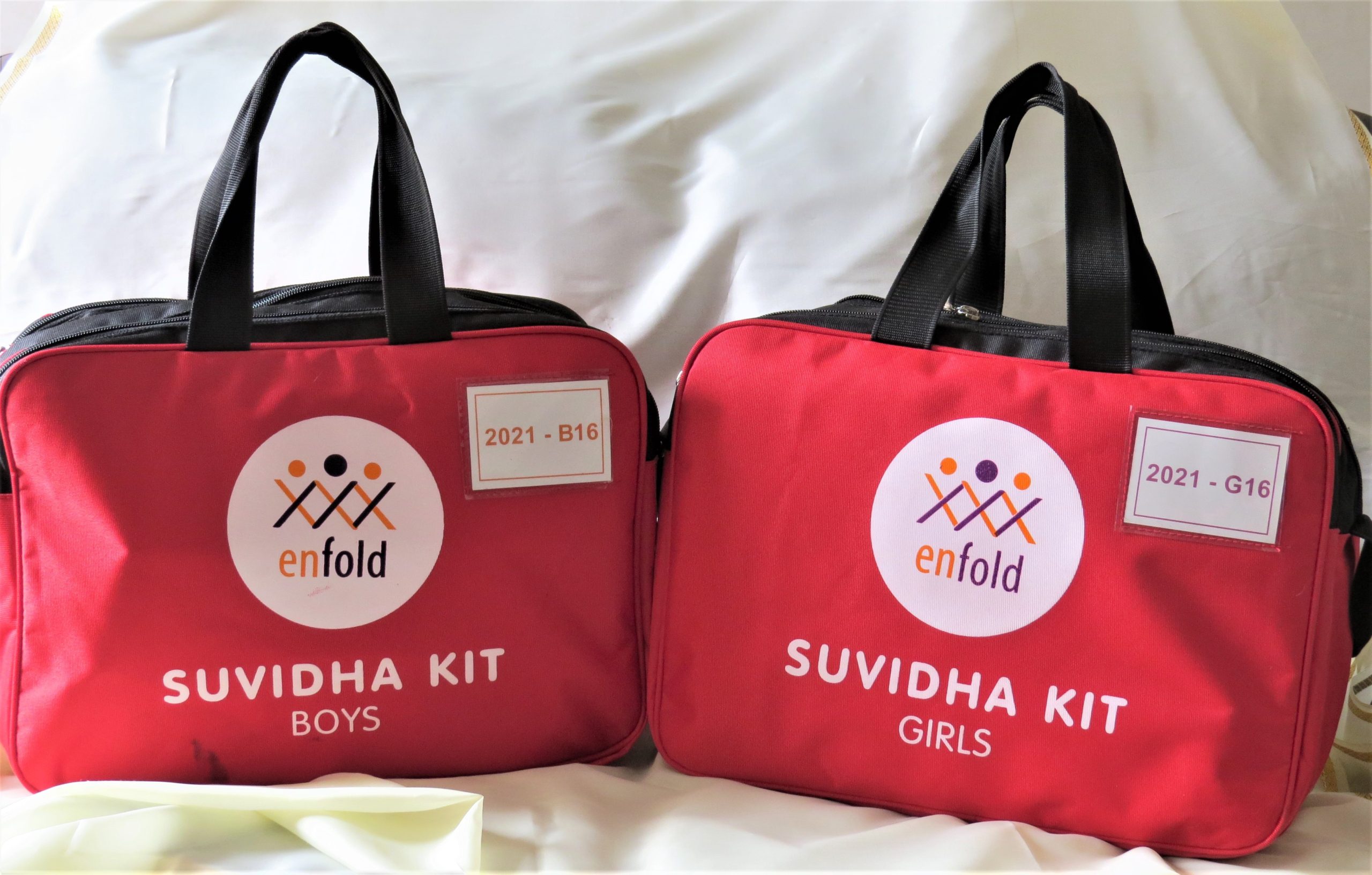Restorative Practices Team: Creating a restorative culture that values relationships, empathy, and accountability.
Restorative practices are a set of principles, approaches, and techniques aimed at resolving conflicts, repairing harm, fostering positive relationships and a sense of community. The Restorative Practices team at Enfold works towards implementing and promoting these practices, within various settings such as schools, child care institutions established within the child protection system, or community organisations. The philosophy underpinning this work is rooted in the principles of restorative justice, which emphasise healing, repairing harm, and rebuilding relationships. It is based on the belief that when conflicts arise or harm occurs, it is essential to shift the focus from punishment and blame to understanding, empathy, and accountability.
The Restorative Practices team utilises Restorative Circles as a key tool to foster communication, understanding, and healing within a group or community. Restorative Circles are structured dialogues that bring together individuals for dialogue, to repair harm, build strong relationships, and contribute to their overall well-being and resilience.
Our work with children in Child Care Institutions (CCIs)
When working with children in conflict with the law and children in need of care and protection, housed in CCIs established under the Juvenile Justice (Care and Protection of Children) Act, 2015, the team utilises the Restorative Circle practice to:
– establish safe and supportive environments where children feel comfortable sharing their experiences, concerns, and aspirations.
– promote their healing and reintegration into society.
– provide individualised support tailored to their specific needs, recognizing that each child’s situation is unique.
Capacity building workshops on Restorative Circles
The team organises capacity building workshops to equip participants with the knowledge, skills, and confidence to effectively facilitate Restorative Circles, especially within their communities, organisations, or CCIs. The workshop provides a comprehensive and interactive learning experience that combines theoretical understanding with practical application. Participants delve into the principles and philosophy behind Restorative Circles, exploring how this Restorative practice can be a powerful tool for fostering communication, building relationships, and resolving conflicts.
Number of Experiential Training workshops facilitated by the team till June 2023 : 22. Number of participants who completed the training: 509 (129 Govt.CCI staff and 380 NGO staff) Other states participants travelled from: Rajasthan, West Bengal, Maharashtra, Chhattisgarh, Delhi, Goa, Bihar Number of Civil Society Organisations who deputed participants for the training: 27. (Aishwarya Mahila Samsthe, APSA, Baale Mane, Calvary Chapel Trust, Centre for Mental Health Law & Policy, CMS Children’s Home, Darshan Open Shelter, Hemmersbach, Karunya Mane, Maarga, Makkala Jagriti, Mother’s Home, My Child, Operation Shanti, Orphanage Home for Boys – Tumkur, Planet Mars Foundation, Sarvodaya Service Society, Shanti Sandesha Trust, Shri Shakti Open Shelter, Shrishti Open Shelter for Children, Siddeshwara Rural Development Society Open Shelter, Sneha Open Shelter, Sri Kanakadasa Orphan Children Institution, Swasti, Udayan, Vijayalaxmi Open Shelter, Vivekananda Children’s Open Shelter Home, and WeLive Foundation.)
Significant Programmes
Naanu Samartha – Capacity Building of Staff of Child Care Institutions in Karnataka on Restorative Circles (2021-22)
With support from the Directorate of Child Protection, – Government of Karnataka, BOSCH CSR Initiative and UNICEF- Field office for Andhra Pradesh, Karnataka & Telangana, the team successfully trained 117 staff of CCIs or organisations working in CCIs, enabling them to conduct Life Skills based Restorative Circles with children in their care. This was conducted from September 2021 to May 2022.
Feedback from participants about Enfold’s experiential training on Restorative Circles:
– 95% felt facilitators provided adequate, relevant and practically applicable feedback.
– 91% felt that the resource pack was sufficient and useful.
– 86% felt that the duration and depth of program was adequate for basic understanding of Restorative Approaches.
– 91% felt that Circles corresponded to the objectives of the course.
– 91% felt that the facilitators were able to answer doubts and concerns.
– 90% felt that the facilitators explained the concepts in a clear and logical manner.
Key learnings shared by participants themselves were:
– “I learnt about how to behave with children, and learnt how to make a safe place for children to share their feelings. And how to make them feel free”. (Batch 8 participant)
– “I have learnt how to plan a circle, how to make children feel comfortable and safe with my approach and the way of my communication with the children and learnt to be patient”. (Batch 3 participant)
– “Circle is a space where I have learnt to listen to others with respect. Express myself openly. Identify the problem of children, listen to them and help children to find a way themselves to solve the problem. Listen to others’ experience and use the lessons which they have learnt during the process of solving problems and use it in your life too.” (Batch 1 participant)
During the period of June to December 2022, handholding support was provided to 11 staff of Government run CCIs who had been trained in Restorative Circles, through onsite field visits to 5 CCIs ( Govt. Girls Home, Bellary; Govt. Girls Home, Koppal; Govt. Boys Home, Belagavi; and Govt. Boys Home, Bengaluru. The team provided feedback to the participants on their planning and facilitation of the Circles. According to the participants, the practice of Circles has improved the quality of their interpersonal relationships with the children, and also enhanced the children’s sense of self-esteem, confidence levels, communication skills, and emotional regulation.
Feedback from staff of Government-run CCIs in Karnataka and NGO staff working in these spaces who have been trained by Enfold is available to watch here – https://www.youtube.com
Restorative Practices team members during an onsite field visit to CCIs providing handholding support to participants who were previously trained by the team.
2. Naanu Samartha (I am capable) – An Online Life Skills Program for Children in the Juvenile Justice System (2020)
The COVID-19 lockdown in March 2020, brought Enfold’s Restorative Practices team’s work in two government-run Child Care Institutions (CCIs) to an abrupt and grinding halt. The Supreme Court’s order directing Juvenile Justice Boards to proactively consider releasing children from CCIs resulted in many children in conflict with the law being released to their families. From May 2020, the Restorative Practices team began following up with 15 such boys and observed the severe impact of the lockdown on them and their families. It was evident that they were moving from situations of vulnerability arising from the stigma of alleged crime, the effect of institutionalisation and frayed familial relationships to situations of further psycho-socio-economic risk. During the individualised follow-up calls, the team sensed deep frustration and restlessness among the boys and felt that this was a crucial time for an intervention that would help channel their thoughts and energies in constructive ways, and provide them tools to address the challenges they faced.
To respond to this need, the team developed Naanu Samartha (I am capable), an intense 8-week online program for adolescent boys (15-20 years) in the juvenile justice system, comprising 15 input and six follow-up sessions on life skills themes such as self awareness, interpersonal relationships, understanding and managing emotions, decision-making, problem-solving, gender sensitivity, basic communication skills, financial literacy, substance abuse, digital safety, and government schemes and vocational trainings.
Ms. Pallavi Akaruthi, Director, ICPS, Department of Women and Child Development, Government of Karnataka immediately saw the potential of the pilot and presented it to the Members of the High Court Committee on Juvenile Justice as well as the Principal Magistrates and Members of Juvenile Justice Boards. With their approval and the support of UNICEF office for Andhra Pradesh, Karnataka and Telangana, and Members of Juvenile Justice Boards of Bengaluru, Kalaburgi, and Mysore, the fascinating journey of the Naanu Samartha Pilot Program began on 2 August 2020.
Of the 12 boys who participated in the online course, 10 boys completed it on 21 October 2020. They braved technological challenges including power cuts, network issues, data problems, as well as domestic problems such as lack of privacy and gruelling work schedules. The incorporation of restorative elements, such as co-creation of values for the sessions, the use of a talking order, and using powerful reflective questions to guide the discussions, helped create a safe space for self-reflection and enabled the boys to express themselves comfortably. While COVID-19 has aggravated vulnerabilities, it created opportunities for us to reach adolescents in districts such as Mandya, Kalaburagi, Shivamogga, Sholapur, and Mangalore, and enable their access to an online social-emotional learning program.
Following the success of the pilot programme, the RP team decided to offer the Naanu Samartha program to girls in the juvenile justice system. The second batch began on 30 September 2020 for 22 children living in one Child Care Institution (Ashadeep), Bengaluru and the third batch began on 14 December 2020 for 11 children integrated back into the community, again with support from the Directorate of ICPS, Department of Women and Child Development and Empowerment of Differently Abled and Senior Citizens, Government of Karnataka; UNICEF Field Office for Andhra Pradesh, Telangana and Karnataka and Azim Premji Philanthropic Initiatives (APPI). A total of 32 girls from Bengaluru and one from Kalaburagi participated and 29 completed the course. Together with members of the Enfold team and external facilitators, the girls engaged in self-reflection on various life skills such as self-awareness, interpersonal relationships, gender, and managing emotions. They also received inputs on financial literacy and learned about various Central and State level schemes and vocational training opportunities that they could access. The use of Restorative Circle elements during the sessions enabled the co-creation of safe spaces in which the girls could comfortably share their thoughts, feelings, and aspirations.
The program enabled a wonderful convergence between a wide range of stakeholders in child protection – government, judiciary, UNICEF and civil society including children and families themselves. Our collective energies enabled us to feel a sense of “Nāvu samartharu” – i.e. “we are capable” – capable of working together for a common cause – reaching children and families who are truly at the last mile by breaking the digital divide even during a devastating pandemic!
Snippets
– In the Circle I can show my feelings that I have from so many days. I have learnt many values.
– We are treated like equals, no one is big or small – everyone has a place to speak.
– I like to sit in a circle because it means a lot to us. It’s like teamwork.
– I like the vision of a good life topic circle because it helps us to figure out our aims and gives positive energy to us.
– I learned that when someone is speaking, respect them, listen to them and use signals and not shout if I want to say something.
– It helps me to speak freely and I don’t get scared. I shared one of my problems in the circle and everyone gave me suggestions. That day I felt so thankful to
be part of this circle. They helped me solve my problem.
– I learned about understanding, love and helping each other.
– I can share my feelings with everybody, and I should not be scared.
3. Capacity Building on Restorative Circles at Innisfree House School (2019)
In May 2019, 13 teachers and 2 Counsellors of IHS were trained on Restorative Circles over a period of five days. Participants were introduced to the Circle elements, and experienced Circle process, while sharing their thoughts and feelings on topics such as ‘Building Relationships and Shared Values’, ‘Enhancing Self-Awareness in Conflict Situations’, ‘Enhancing Responsibility and Accountability’, and introduced to Restorative Circle Process in Education in other countries. Participants were supported in facilitating Circles on their own in smaller groups, on topics such as relationships, success and failure, power, anger, bullying, and on changing beliefs. The team of teachers and counsellors that had been trained then started facilitating weekly Circles from June 2019 for students from classes 1 to 10. Members of the Enfold team observed a minimum of three Circles facilitated by each of them, and provided detailed feedback to each one in writing. A half-day workshop was also conducted for teachers of classes 1 and 2 to enable them to assist the facilitation of Circles with these very young students in the school.
The feedback of the students was overwhelmingly positive. Most students expressed that the Circles helped them feel respected, heard as equal participants and confident that whatever they say won’t be shared outside of the Circle, enabling them to share their feelings more openly.
The report documenting the pilot initiative and the feedback of the children can be accessed at https://enfoldindia.org/wp-content/uploads/2020/11/Life-Skills-Through-Restorative-Circles.pdf
Online workshop on Restorative Justice for Holistic Justice in India
In collaboration with Dr. Beulah Shekhar, Professor Emerita Department of Criminology Karunya Institute of Technology & Science Coimbatore, the Restorative Practices team organized an online workshop on ‘Restorative Justice for Holistic Justice in India,’ from 10 May-18 May, 2021. Six sessions were conducted by renowned experts in Restorative Justice – Dr. Beulah Shekhar, Dr. Keerthi Bolleneni Vasavya Mahila Mandali, Andhra Pradesh, Dr. John Winterdyke, Full Professor of Criminology, Mount Royal University on Canadian perspectives on Restorative Justice & Best Practices, Michael O’Connell AM APM, Consulting Victimologist and Secretary General, World Society of Victimology, and Vidia Negrea, Vice Chair Regional Representative, Budapest, Hungary. It was attended by 40 participants from across India.
Academic Courses taught on Restorative Justice
– Arlene Manoharan and Swagata Raha taught part of a module on Restorative Justice to students of an MA program of Maharashtra National Law University (MNLU) on Mediation & Conflict Studies during Feb-March 2022. Arlene Manoharan and Dee offered the same module during Jan-Feb 2023 .
– In 2022, Shruthi Ramakrishnan, Swagata Raha, and Arlene Manoharan offered a one credit course on Restorative Justice Approaches to undergraduate students at St Joseph’s College of Law.
Participation in Webinars/events
Swagata moderated a talk by Prof Carl Stauffer, organised by Counsel to Secure Justice on Youth Harm & Violence: Restorative Justice, Whole Systems Approaches (18 Nov 2020).
The RP team collaborated with Counsel to Secure Justice and jointly hosted a webinar on Preventing & Addressing Violence against Children through Restorative Practices in Communities, Schools & Child Care Institutions (20 Nov 2020). Shivangi Puri presented the RP team’s work during this webinar.
Arlene was a panellist in a webinar on Tracking Growth of Restorative Justice Practices in India, organized by Urivi Vikram Charitable Trust, (23 Nov 2020).
The RP team collaborated with Restorative Justice Initiative, USA for a Storytelling event for RJ practitioners from South Asia and the South Asian diaspora, (19 Dec 2020). Shivangi Puri participated in this event as a storyteller.
Webinar on Restorative Justice and Children’s Rights, Jindal Law School: Arlene was a panellist (Oct 21).
South Asia level webinar on Restorative Approaches to Prevent and Address Violence Against Children in Schools, organized by Samya Development Resources and Coalition for Good Schools Asia and Sub-Saharan Africa hubs on Restorative Approaches to Prevent and Address Violence Against Children on 14 December 2022. Arlene Manoharan was a panelist for this webinar.
Arlene Manoharan & Swagata Raha, Co-Directors of the Restorative Practices team presented on Co-creating an Ecosystem for Restorative Practices in India at the RJ World eConference 2022.
Arlene Manoharan and Dee attended the Agami Summit 2022 at Panchgani, where a short video about the team’s work on Restorative Practices was screened. They also designed and co-facilitated a Restorative Circle for select participants along with Sachi Maniar-(Ashiana), and Nimisha Srivastava (Counsel to Secure Justice), to enable an experiential understanding of Restorative Practices. Interest in Restorative Justice was fostered and triggered follow-on discussions on aspects related to strategies of working with children and with adult undertrials/prisoners through restorative approaches. See https://www.youtube.com
Publications
Swagata Raha, “Pathways and Possibilities for Restorative Justice in India’s Juvenile Justice System“, pp. 269-297 in Verma & Eusebius, eds., Juvenile
Justice Law in India: A Critical Study, National Judicial Academy (2020). Book Chapter.
Facilitation of Life Skills in Child Care Institutions in time of COVID-19 and Beyond – A Handbook for Staff and Volunteers, September 2020
Life Skills Through Restorative Circles: A collaboration between Enfold Proactive Health Trust and Innisfree House School, Bangalore. Highlights of Feedback received on the Pilot Programme (May 2019 – March 2020), 20 November, 2020.
Handbook for Facilitation of Restorative Practices in Child Care Institutions – with support from UNICEF Field Office for Andhra Pradesh, Telangana and Karnataka, May 2021
Life Skills -workbook for adults – published by Enfold Proactive Health Trust, 2019
Facilitating Life Skills with Adolescents – published by Enfold Proactive Health Trust, 2019
Podcasts
Arlene spoke on the inaugural Podcast along with Justice Madan Lokur as part of a series developed by Catalysts for Social Action titled ‘Care of the State’ (https://open.spotify.com/episode) also featured in an article on this in the Hindu – https://www.thehindu.com/news
Children’s Day Celebrations for children residing in all Govt-run CCIs in Bengaluru
The team raised funds, identified additional resources persons and conducted a day-long programme (magic show, zumba, etc.) for approximately 500 children residing in CCIs on 12 November 2022
System Strengthening: The team engages in system strengthening work, while working in constructive collaboration with the State Government and civil society organizations. Some examples of such efforts are:
– Contributing to developing and steering the Volunteer Management Group to respond to the needs of children affected by COVID, including conducting an orientation conducted for the registered volunteers on 4 July 2020.
– Organizing meetings between officials of the Directorate of Child Protection, Government of Karnataka at the State level, as well as at District level with representatives of BOSCH CSR initiative to explore and consolidate projects aimed at strengthening infrastructure and collaborative partnerships with civil society organizations in the District through CSR.

